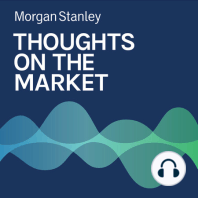3 min listen

U.S. Economy: The Next American Productivity Renaissance, Pt. 2
U.S. Economy: The Next American Productivity Renaissance, Pt. 2
ratings:
Length:
8 minutes
Released:
Mar 3, 2023
Format:
Podcast episode
Description
The way companies and individuals spend their money has changed in the wake of the COVID pandemic. How might market leadership shift as a result and will new market winners come into focus? Chief Cross-Asset Strategist Andrew Sheets and Chief Investment Officer for Wealth Management Lisa Shalett discuss.----- Transcript -----Andrew Sheets: Welcome to Thoughts on the Market. I'm Andrew Sheets, Chief Cross-Asset Strategist for Morgan Stanley Research. Lisa Shalett: And I'm Lisa Shalett, Chief Investment Officer for Morgan Stanley Wealth Management. Andrew Sheets: And on part two of this special episode, we'll be continuing our discussion of the "Next American Productivity Renaissance". It's Friday, March 3rd at 2 p.m. in London. Lisa Shalett: And it's 9 a.m. in New York. Andrew Sheets: So Lisa, let's take this to markets, how do you think this impacts equity market leadership, given that we've been in a market that's really been defined by the age of secular stagnation. What do you think happens now and who will be those new leaders? Lisa Shalett: This is one of the most important, I think, outcomes of our thesis. And that is that pendulums swing and market leadership shifts all the time, but when it's at that moment of inflection there's huge amounts of pushback, typically. Our sense is that the wealth creation ahead of us may not be in the current leadership in consumer tech, but rather in enterprise tech and the technology providers who are the leaders in new automation technologies that are going to allow us potentially to automate parts of our economy that have heretofore resisted. So it's a lot of the services side of the economy. Think of financial services, consumer services, government services, education services, how manual some of those industries are. And yet when we think about these triads or four or five level combinations of things like artificial intelligence, and machine learning, and optical scanning, and natural language processing and voice recognition. These are things that could really transform service-oriented businesses in terms of their margins and the economics of them. And so we envision a leadership that is potentially bimodal, that includes the tech enterprise enablers. Some of the software or software-as-a-service, some of the technology consultants who will help implement these automation programs and some of the beneficiaries, the tech takers, right. Think about some of those banks, those insurance companies, those healthcare companies, educational-oriented institutions that are just so heavy in manual service support infrastructures that could be rationalized. Andrew Sheets: So I'd like to dive into two of those threads and in just a little bit more detail. Just in terms of, kind of, the decade we've just been in. And, you know, I think it was pretty unique that it was a decade with some of the lowest cost of capital we've ever seen in economic history, and yet, you know, it's kind of left us with an economy where it's very easy to order food and very hard to take a train to the airport. We've had a lot of investment in consumer-led technology and a lot less in infrastructure. Do you think that equation has finally changed in a bigger way? And what do you think that means for maybe winners and losers of the changes that might be happening? Lisa Shalett: Our perspective is that I don't know that it's a permanent change. I think pendulums swing and there are waves when technology is more consumer-oriented. The issue with consumer technology, as we know and certainly with the smartphone, has been there's 2 billion people implementing that technology in 2 billion different ways. So it's very hard to scale those productivity benefits, if there are any, across an economy. When you go through periods of enterprise or economy-wide or infrastructure deepening-based technology spends, that's when economies can transform. And so I think it's a phase in the market. But I think one that is really important
Released:
Mar 3, 2023
Format:
Podcast episode
Titles in the series (100)
Mike Wilson: Are U.S. Economic Indicators Flashing Yellow? by Thoughts on the Market